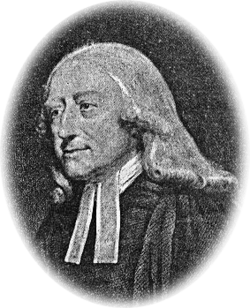| Part of a series on |
| Methodism |
|---|
 |
|
|
The Sunday Service of the Methodists[nb 1] is the first Christian liturgical book given to the Methodist Churches by their founder, John Wesley. It has its basis in the 1662 Book of Common Prayer.[2] Editions were produced for Methodists in both the British Empire and in North America.[3] Wesley published the first edition in 1784 as The Sunday Service of the Methodists in North America with Other Occasional Services.[2]
The liturgical book reflects Wesley's theological preferences. For instance, the officiant is referred to as "minister", "elder" or "deacon", not "priest". Among the items of the Book of Common Prayer that Wesley "did not undertake to defend" were saints' days, priestly absolutions, the answers of the sponsors in baptism, private baptism, sung liturgical texts, the ring ceremony in the marriage rite (which Wesley considered pagan[3]), and certain resurrection language in the burial rite.[1][2] The Nicene Creed is also excluded from the communion rite, as the Apostles' Creed is already recited in Morning Prayer.[2] Some prayers use modernised language, such as changing the Lord's Prayer from "which art in heaven" to "who art in heaven".[2]
In England, Wesley's liturgical book was not replaced in the Wesleyan Methodist Church until 1882 and even then, though not widely used, continued in print for a while.[1] The Sunday Service has immensely influenced later Methodist liturgical texts.[4] The Order for Morning Prayer for the Methodist Episcopal Church, for example, was adapted from The Sunday Service.[4] Later, the 1965 Book of Worship for Church and Home reprinted the original Morning Prayer office used in The Sunday Service.[4] Many of the liturgical rites, such as that of the Lord's Supper, in "The Ritual" of The Discipline of The Allegheny Wesleyan Methodist Connection have preserved various prayers published in The Sunday Service.[5]
- ^ a b c George, A Raymond (2008). "Sunday Service of the Methodists in North America". In Vickers, John A (ed.). A Dictionary of Methodism in Britain and Ireland. Retrieved 1 March 2025.
- ^ a b c d e Tucker, Karen B. Westerfield (July 1996). "John Wesley's Prayer Book Revision: The Text in Context" (PDF). Methodist History. 34 (4). General Commission on Archives and History, United Methodist Church: 230–247. Retrieved 14 October 2014.
- ^ a b Coe, Bufford W. (1996). John Wesley and Marriage. Lehigh University Press. p. 11. ISBN 9780934223393.
- ^ a b c Hefling, Charles; Shattuck, Cynthia (1 July 2006). The Oxford Guide to The Book of Common Prayer. Oxford University Press. p. 213. ISBN 9780199723898.
- ^ The Discipline of the Allegheny Wesleyan Methodist Connection (Original Allegheny Conference). Salem: Allegheny Wesleyan Methodist Connection. 2014. pp. 133–166.
Cite error: There are <ref group=nb> tags on this page, but the references will not show without a {{reflist|group=nb}} template (see the help page).
